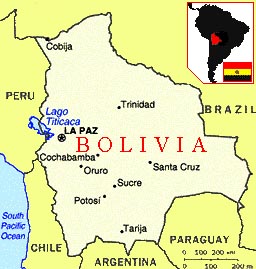Three killed as unemployed miner blows himself up in Bolivian Congress
 The desperate worker was protesting an unpaid pension. He killed himself and two policemen. The government said the incident did not have political implications.
The desperate worker was protesting an unpaid pension. He killed himself and two policemen. The government said the incident did not have political implications.
Shortly after Bolivia's president Carlos Mesa left the Congress palace in La Paz, a desperate unemployed miner blew himself up on Tuesday, killing himself and two policemen. The worker, carrying dynamite charges (very easy to buy at low prices in Bolivian markets) claimed for an unpaid pension. According to official reports, ten others –all police and firefighters- were also injured in the incident.
Eustaquio Picachuri entered a side door to Congress and walked through a corridor before setting off the dynamite strapped to his body. "It was a regrettable, isolated incident, without any political implications," Mr. Mesa told reporters. The president said the miner was "in an apparent state of desperation".
Mr. Mesa, who works in the nearby government palace in the historical centre of La Paz, had left the area 15 minutes earlier to watch a soccer match for the World Cup playoffs and was unharmed, officials told local media. The policemen spent two hours trying to dissuade the miner from blowing himself up, officials said.
Despite it does not look like the incident may have immediate political implications, it came in a very delicate moment in South American poorest country political life. It also tells about the tough situation hundreds of thousands of workers have gone through in Bolivia's recent history.
Today, President Carlos Mesa tries to ease tensions in Bolivia after October's deadly national revolt by farmers, workers and miners. No less than 80 people died in the revolt that led to the ouster of President Gonzalo Sanchez de Lozada. The issue was internationally known as the “gas war”, because a controversial project to export country's huge gas reserves to the United States using Chilean ports had found stiff resistance from the local population.
A deeper analysis shows that crisis has a structural root: Bolivia is South America's poorest country. Over 70% of the people live under poverty line, almost the same than in the times it was a Spanish colony. As well as in those times (-1700's - 1800's), a European elite that reaches 10% of the population controls the country, mostly populated by indigenous farmers.
Bolivia has a long tradition of foreign exploitation, beginning with Spanish colonizers in the 17th century sending home the riches of the Potosi silver mines, which were left exhausted. Today, the silver remains are extracted by miners who form cooperatives, without any kind of social care and medical protection despite the toughness of their jobs. The 47-year old miner Eustaquio Picachuri was one of them.
Subscribe to Pravda.Ru Telegram channel, Facebook, RSS!





